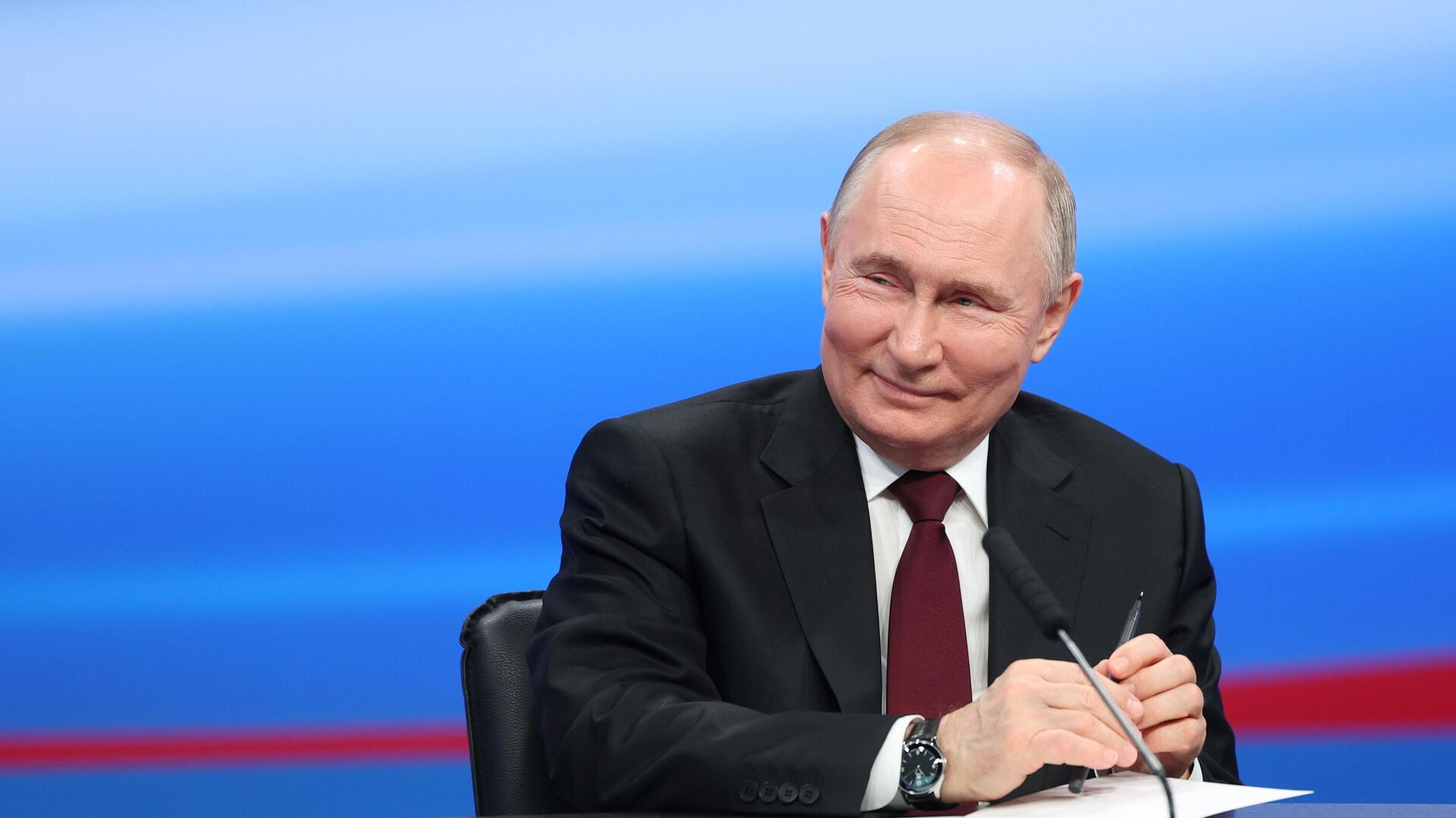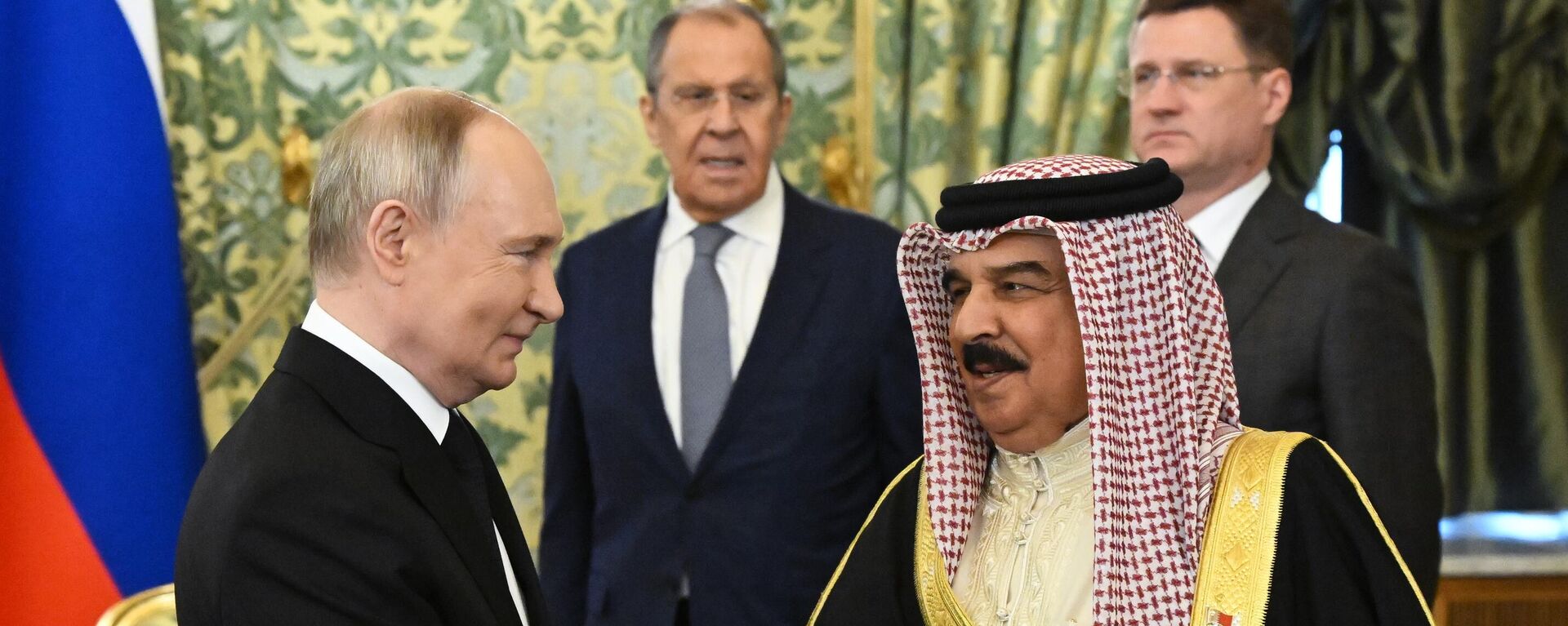https://sputnikglobe.com/20240524/bahrain-asking-for-moscows-support-for-gaza-peace-summit-another-sign-of-us-influence-waning-1118609305.html
US Influence Slipping as Bahrain Calls for Russia's Help in Ending Gaza War
US Influence Slipping as Bahrain Calls for Russia's Help in Ending Gaza War
Sputnik International
The United States' influence is waning in the Middle East, as evidenced by a series of setbacks in the region, the most recent being the King of Bahrain asking for Russia to mediate a peace conference for the Middle East.
2024-05-24T02:40+0000
2024-05-24T02:40+0000
2024-05-24T04:37+0000
analysis
bernard tremblay
hamad bin isa al khalifa
russia
saudi arabia
israel
arab league
iran
israel-gaza conflict
https://cdn1.img.sputnikglobe.com/img/07e8/03/12/1117396693_0:0:3204:1802_1920x0_80_0_0_72ac173cefa0f391887e9b12fbe42c03.jpg
The decision to pick Russia represented yet another thumb in the eye to the United States, which has long seen itself as the only country capable of mediating relations between Israel and Palestine.“At the Arab summit in Bahrain, the situation in the Gaza Strip was discussed, and we want the war to stop," the king said. “There is full agreement among Arab countries on the need to hold a peace conference to resolve the Middle East issue. Russia is the first country to which we have turned with a call to support its holding, as Russia is the most influential country on the international stage.”Filmmaker and documentarian Regis Tremblay noted that the League turning to Russia first rather than the United States or a regional ally was an important signal.The United States and the West have played an oversized role in shaping the region for years, brokering deals with Egypt and Jordan to normalize relations with Israel but have made little progress since 1994.“[The Arab countries] realize that there has not been any progress. That this has been duplicitous and mendacious all these years. You’re talking 80 years now,” Tremblay explained. “And now turning to Russia as a mediator. For Russia, this is huge, not only for its international reputation and prestige but for its direct influence in the Middle East. Huge.”In November, Saudi Arabia signed a $7 billion currency swap with China, deepening the two countries’ ties and a potential major step towards Saudi Arabia selling oil priced in Chinese Yuan. And last year, Saudi Arabia resumed diplomatic relations with Iran seven years after severing them.King Hamad also called for the normalization of relations with Iran, another sign of the US’ waning influence in the region.The Arab League was formed in 1945 and currently consists of 22 Middle Eastern and North African nations, including Jordan and Egypt, two countries seen as friendly to Israel as well as Saudi Arabia, which was reportedly in discussions to normalize relations with Israel before October 7.
https://sputnikglobe.com/20240523/bahrain-seeks-russian-support-for-mideast-peace-conference-1118598630.html
russia
saudi arabia
israel
iran
Sputnik International
feedback@sputniknews.com
+74956456601
MIA „Rossiya Segodnya“
2024
News
en_EN
Sputnik International
feedback@sputniknews.com
+74956456601
MIA „Rossiya Segodnya“
Sputnik International
feedback@sputniknews.com
+74956456601
MIA „Rossiya Segodnya“
russia mediates peace in middle east, bahrain calls on russia, arab league calls to end war in gaza,
russia mediates peace in middle east, bahrain calls on russia, arab league calls to end war in gaza,
US Influence Slipping as Bahrain Calls for Russia's Help in Ending Gaza War
02:40 GMT 24.05.2024 (Updated: 04:37 GMT 24.05.2024) On Thursday, King Hamad bin Isa Al Khalifa of Bahrain said that for the first time, the Arab League is united in calling for an end to the war and Gaza and that a peace conference should be held. He said that Russia was the first country he asked to support the initiative, calling Moscow “the most influential country on the international stage.”
The decision to pick Russia represented yet another thumb in the eye to the United States, which has long seen itself as the only country capable of mediating relations between Israel and Palestine.
“At the Arab summit in Bahrain, the situation in the Gaza Strip was discussed, and we want the war to stop," the king said. “There is full agreement among Arab countries on the need to hold a peace conference to resolve the Middle East issue. Russia is the first country to which we have turned with a call to support its holding, as Russia is the most influential country on the international stage.”
Filmmaker and documentarian Regis Tremblay noted that the League turning to Russia first rather than the United States or a regional ally was an important signal.
“What is extremely important from my perspective: they are turning to Russia to be a mediator in the end of this conflict,” Tremblay noted on Sputnik’s
The Critical Hour. “What a statement the Arab League has made to their sugar daddy, the United States of America for all these years.”
The United States and the West have played an oversized role in shaping the region for years, brokering deals with Egypt and Jordan to normalize relations with Israel but have made little progress since 1994.
“[The Arab countries] realize that there has not been any progress. That this has been duplicitous and mendacious all these years. You’re talking 80 years now,” Tremblay explained. “And now turning to Russia as a mediator. For Russia, this is huge, not only for its international reputation and prestige but for its direct influence in the Middle East. Huge.”
In November, Saudi Arabia signed a $7 billion currency swap with China, deepening the two countries’ ties and a potential major step towards Saudi Arabia selling oil priced in Chinese Yuan. And last year, Saudi Arabia resumed diplomatic relations with Iran seven years after severing them.
King Hamad also called for the normalization of relations with Iran, another sign of the US’ waning influence in the region.
“We used to have problems with Iran, but now there are practically none. There is no reason to delay normalization of relations with Iran,” he said.
The Arab League was formed in 1945 and currently consists of 22 Middle Eastern and North African nations, including Jordan and Egypt, two countries seen as friendly to Israel as well as Saudi Arabia, which was reportedly in discussions to normalize relations with Israel before October 7.



